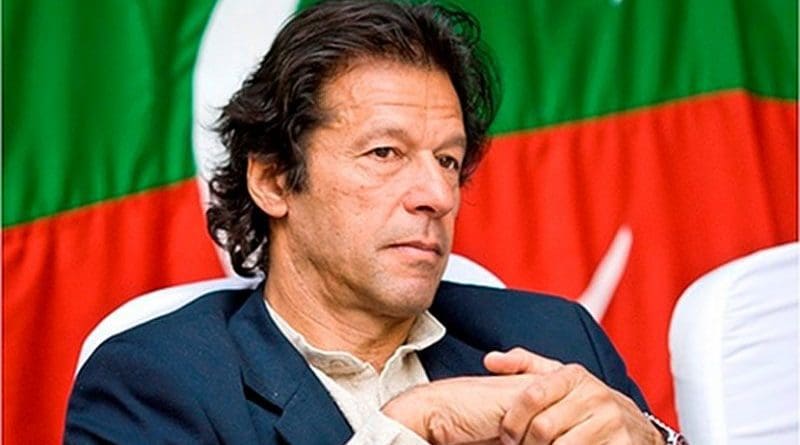Imran Khan’s Exit: A Chance For Pakistan To Reset Its Economy And Politics – OpEd
Pakistan is on the brink of an economic meltdown that could have disastrous consequences for its people and the region. But this crisis is not a result of bad luck or external forces. It is a self-inflicted wound caused by the poor policy choices and mismanagement of the former Prime Minister Imran Khan and his party, the Pakistan Tehreek-e-Insaf (PTI). In this OP-Ed, I will explain how Khan’s populist agenda and economic blunders have pushed Pakistan to the edge of default and instability, and what the new government that will emerge after the next elections in 2023 should do to reverse this situation and put the country on a path of sustainable and inclusive development.
To understand how Pakistan got into this mess, we need to look at Khan’s economic record since he came to power in 2018. One of his biggest blunders was to delay seeking an IMF bailout package that could have provided much-needed relief and credibility to the economy. The economic crisis has had severe social and political consequences for Pakistan.
The economic crisis has also eroded Khan’s popularity and legitimacy as a leader. Pakistan’s economic crisis is not inevitable or irreversible. It can be overcome with bold leadership, sound policies and international cooperation. (Transition from second main point to third main point)
The new government should pursue a three-pronged strategy to address the economic crisis. Pakistan’s economic crisis is a self-inflicted wound that can be healed with the right treatment.
He inherited a fragile economy that was burdened by a large fiscal deficit of 6.6% of GDP, a chronic current account deficit of 6.1% of GDP, a low tax-to-GDP ratio of 11.6%, a high debt-to-GDP ratio of 72.5%, a weak currency that depreciated by 31% against the US dollar in 2018, low foreign exchange reserves of $7.3 billion (enough to cover only 1.7 months of imports), high inflation of 9.4% in 2019, low growth of 1.9% in 2019 and rampant unemployment of 8.9% in 2019, according to the World Bank and IMF data.
The poverty rate has increased from 24% in 2018 to 40% in 2021, according to the World Bank. This means that more than 80 million people are living below the poverty line of $1.90 per day.
According to a recent survey by Gallup Pakistan, Khan’s approval rating has dropped from 58% in August 2018 to 37% in May 2021.
As Nobel laureate economist Amartya Sen has argued, “Human capital is both a means and an end of economic development.” Investing in education, health care and social protection not only improves the quality of life of the people, but also enhances their productivity and employability.
Instead of addressing these structural problems with pragmatic and comprehensive reforms, Khan opted for ad hoc and inconsistent measures that only exacerbated the situation.
Khan soon realized that his lofty ambitions were not matched by his economic acumen or political savvy.
He also launched an ill-conceived austerity drive that slashed public spending on development and social sectors, while increasing taxes and utility prices for the masses.
His economic mismanagement, using the spectre of anti-corruption to hound rivals and critics, and impulsive policy U-turns undermined his agenda. He was dependent on the military’s support and failed to assert civilian supremacy over key issues such as security and foreign affairs. He caused inflation, unemployment, poverty, and debt by increasing taxes, cutting subsidies, devaluing the currency, and borrowing excessively. His foreign policy choices, such as his recent visit to Russia and his strained relations with the US and India led to Pakistan’s economic problems.
Faced with defeat in the no-confidence vote in parliament, Khan alleged a US-led plot to remove him as punishment for his Russia trip and neutral foreign policy. He also claimed that local abettors were involved in the conspiracy. However, these claims were rejected by Pakistan’s National Security Committee, which said that there was no evidence of any foreign interference or regime change agenda.
Ultimately, Khan lost the confidence of both his coalition partners and the military, which paved the way for his removal from power. His successor, Shehbaz Sharif of the PML-N party, has vowed to revive the economy and restore political stability. However, Khan has not given up his political ambitions and has urged his supporters to take to the streets on Sunday to contest his removal.
The writer is an Islamabad based independent researcher with a masters in Development Studies and currently pursuing her PHD in International Relations from the University of Wyoming.


A correct analysis of the current economic crisis of Pakistan
wish the author would have done done serious background research and used the latest numbers (one example is citing a two year old Gallup survey). It would have been helpful to compare the economic performance of the current imposed regime and the fact that they have changed the laws to acquit them of massive corruption cases. The author should have at least commented on the massive human rights abuses, muzzling of the press (including the murder of a prominent journalist- Arshad Shareef). There is no mention of the blatant disregard for the constitution and the requirement to hold elections within 90 days in two of the country’s most populous provinces. This is a blatant example of shoddy journalism!